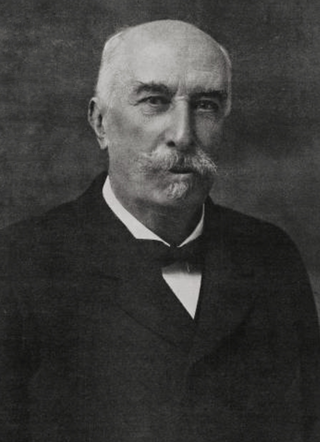
Giovanni Giolitti was an Italian statesman. He was the Prime Minister of Italy five times between 1892 and 1921. He is the longest-serving democratically elected Prime Minister in Italian history, and the second-longest serving overall after Benito Mussolini. A prominent leader of the Historical Left and the Liberal Union, he is widely considered one of the most powerful and important politicians in Italian history; due to his dominant position in Italian politics, Giolitti was accused by critics of being an authoritarian leader and a parliamentary dictator.
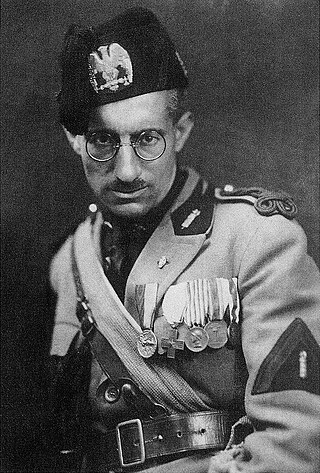
Michele Bianchi was an Italian revolutionary syndicalist leader who took a position in the Unione Italiana del Lavoro (UIL). He was among the founding members of the Fascist movement. He was widely seen as the dominant leader of the leftist, syndicalist wing of the National Fascist Party. He took an active role in the "interventionist left" where he "espoused an alliance between nationalism and syndicalism." He was one of the most influential politicians of the regime before his succumbing to tuberculosis in 1930. He was also one of the grand architects behind the "Great List" which secured the parliamentary majority in favor of the fascists.
Liberalism and radicalism have played a role in the political history of Italy since the country's unification, started in 1861 and largely completed in 1871, and currently influence several leading political parties.

The Italian Liberal Party was a liberal political party in Italy.
Enrico Corradini was an Italian novelist, essayist, journalist and nationalist political figure.

Opera Nazionale Balilla (ONB) was an Italian Fascist youth organization functioning between 1926 and 1937, when it was absorbed into the Gioventù Italiana del Littorio (GIL), a youth section of the National Fascist Party.

The Fasci Italiani di Combattimento was an Italian fascist organisation created by Benito Mussolini in 1919. It was the successor of the Fascio d'Azione Rivoluzionaria, being notably further right than its predecessor. The Fasci Italiani di Combattimento was reorganised into the National Fascist Party in 1921.
The Italian Democratic Party was an Italian right-wing political party founded in 1944.

The National Bloc of Freedom was a short-lived Italian political coalition of monarchist parties, most of which participated to the foundation of the National Monarchist Party. Its symbol was a star.
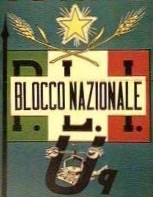
The National Bloc was a right-wing electoral alliance formed for the 1948 Italian general election by the Italian Liberal Party and the Common Man's Front.
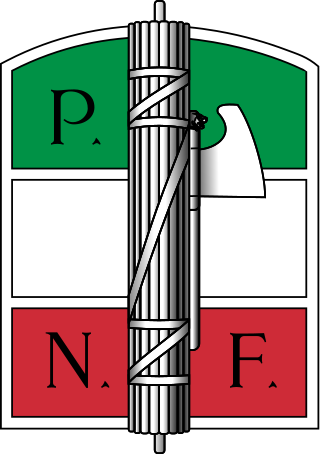
The National Fascist Party was a political party in Italy, created by Benito Mussolini as the political expression of Italian fascism and as a reorganisation of the previous Italian Fasces of Combat. The party ruled the Kingdom of Italy from 1922 when Fascists took power with the March on Rome until the fall of the Fascist regime in 1943, when Mussolini was deposed by the Grand Council of Fascism. It was succeeded, in the territories under the control of the Italian Social Republic, by the Republican Fascist Party, ultimately dissolved at the end of World War II.
The Christian Reformists are a Christian-democratic faction within New Centre-Right (NCD), a political party in Italy.

The Italian Nationalist Association was Italy's first nationalist political movement founded in 1910, under the influence of Italian nationalists such as Enrico Corradini and Giovanni Papini. Upon its formation, the ANI supported the repatriation of Austrian held Italian-populated lands to Italy and was willing to endorse war with Austria-Hungary to do so. The party had a paramilitary wing called the Blueshirts. The authoritarian nationalist faction of the ANI would be a major influence for the National Fascist Party of Benito Mussolini formed in 1921. In 1922 the ANI participated in the March on Rome, with an important role, but it was not completely aligned with Benito Mussolini's party. Nevertheless, the ANI merged into the Fascist Party in October 1923.
This is a list of words, terms, concepts, and slogans in the Italian language and Latin language which were specifically used in Fascist Italian monarchy and Italian Social Republic.
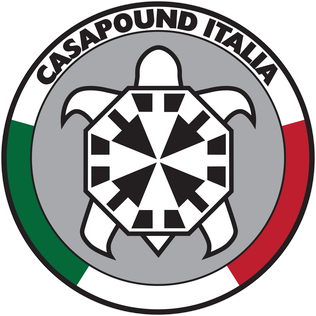
CasaPound Italia is an Italian neo-fascist movement and formerly a political party born as a network of far-right social centres arising from the occupation of a state-owned building by squatters in the neighborhood of Esquilino in Rome on 26 December 2003. Subsequently, CasaPound spread with other instances of squatting, demonstrations and various initiatives, becoming a political movement.
Events from the year 1922 in Italy.

Brothers of Italy is a national-conservative and right-wing populist political party in Italy, the country's largest after the 2022 Italian general election. The party is led by Giorgia Meloni, the incumbent Prime Minister of Italy. According to observers, FdI marked Italy's first republican government led by the "most right-wing party" since World War II.

National syndicalism is a far-right adaptation of syndicalism to suit the broader agenda of integral nationalism. National syndicalism developed in France in the early 20th century, and then spread to Italy, Spain, and Portugal.

The National List also known as Listone was a Fascist and nationalist coalition of political parties in Italy established for the 1924 general election, and led by Benito Mussolini, Prime Minister of Italy and leader of the National Fascist Party.
Blocco Nazionale is Italian for "National Bloc" and may refer to:













